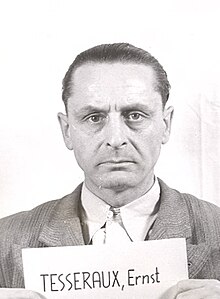Ernst Tesseraux
Ernst Eduard Tesseraux (born September 28, 1900 in Karlsruhe , † 1967 in Mannheim ) was a German SS leader . From 1942 to 1944 Tesseraux was head of the settlement office in the race and settlement main office .
Life and activity
Tesseraux attended the Schwarz preschool in Mannheim and then the Knickenberg Institute near Münster in Westphalia up to Obertertia. Afterwards he was - interrupted by brief participation in the First World War in 1918 and participation in the post-war battles in the Baltic States as a member of the Medem Freikorps - alternately in agricultural and construction apprenticeship. In addition, he attended the Hohenheim Agricultural University for two semesters and worked in his father's construction business in Mannheim for six years.
From 1921 to 1922 Tesseraux was on the German Africa Line. During this time he made various sea voyages. He then went on to various activities until 1926, including a. in his father's business, which had to be liquidated in 1926.
In 1928 Tesseraux emigrated to Canada , where he lived as a settler until 1934. In that year he returned to Germany to take a position at the Junkers company in Leipzig. From there he moved to the Siedlungsgesellschaft Deutschland in the spring of 1937, where he stayed until 1939.
In 1939 Tesseraux joined the Settlement Office in the Race and Settlement Main Office of the SS, where he was initially employed in the main peasant department headed by Dickescheid. In 1940 he became head of this main department himself. On January 1, 1940, he joined the NSDAP ( membership number 7,872,771). He had already joined the SS on September 1, 1939 (SS No. 340.772). In this he last reached the rank of SS-Obersturmbannführer.
From 1942 on, Tesseraux was entrusted with the management of the head of the Settlement Office (one of the two offices that made up the Main Race and Settlement Office) in addition to his work as a department head in the Race and Settlement Main Office. According to his own statements, Tesseraux was not entrusted with the conduct of the business of the head of the settlement office himself, but the SS standard leader Heinrich Thole , who was permanently absent, so that he, Tesseraux, had always represented Thole. Formally, he was neither a regular head of the settlement office nor a substitute entrusted with the administration of the office manager of the settlement office, but merely the representative of the person entrusted with the function of the administration of the office manager - Thole: In In this capacity, his task consisted of the guidance, supervision and supervision of seven settlement societies subordinate to the settlement office (including eighty settler positions subordinate to these settlement societies) as well as the development of plans for the settlement of war-disabled SS men as farmers in the German-occupied areas of Eastern Europe and the practical implementation of these plans through the actual organization of such settlements.
At the end of the war, Tesseraux was captured by the Allies. In the following years he was questioned as a witness during the Nuremberg Trials .
literature
- Isabel Heinemann: "Race, settlement, German blood". The Race and Settlement Main Office of the SS and the racial reorganization of Europe , Wallstein Verlag, Göttingen 2003.
Individual evidence
| personal data | |
|---|---|
| SURNAME | Tesseraux, Ernst |
| ALTERNATIVE NAMES | Tesseraux, Ernst Eduard (full name) |
| BRIEF DESCRIPTION | German SS leader |
| DATE OF BIRTH | September 28, 1900 |
| PLACE OF BIRTH | Karlsruhe |
| DATE OF DEATH | 1967 |
| Place of death | Mannheim |
